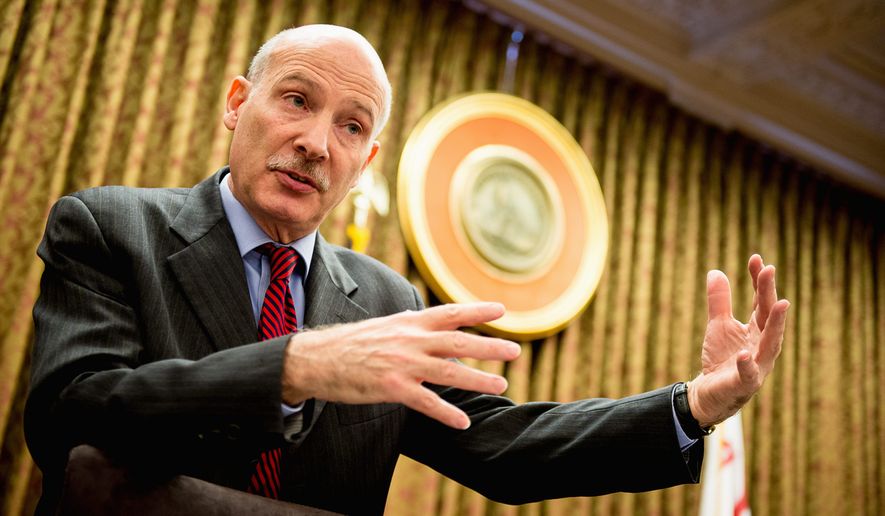A bill that would grant workers in the District paid time off to care for a new child or to tend to an extended illness could still come up for a vote in the D.C. Council this year, but Mayor Muriel Bowser says the money the legislation would cost could be better spent elsewhere.
Council Chairman Phil Mendelson, who has made the Universal Paid Leave Act his top priority this fall, needs to act quickly to get the bill passed before the end of the two-year legislative session in December.
The chairman has been reworking the legislation since the city’s chief financial officer said the original bill would cost too much, and now lawmakers must approve it in two separate votes in less than two months.
“I think there’s still a chance it will get through before the end of the year,” Mr. Mendelson said Monday at a press briefing.
He declined to release details about the reworked legislation but said the amount of time a worker could take off and still get paid will be less than the 16 weeks in the original measure and the 12 weeks in a revised version released earlier this year.
“It will be substantially less,” the at-large Democrat said.
Council member Elissa Silverman, an at-large independent who has been the most vocal supporter of the legislation, said she also believes the bill will pass by the end of the session. Though she supports the full 16 weeks from the original measure, Ms. Silverman said she understands the bill must be fiscally responsible and stick to its 1 percent payroll tax rate to fund the workers’ paid leave.
“Once the chairman weighs in with the final rate, it will be in the hands of our chief financial officer to make sure the taxes brought in pay for the expected benefits to be paid out,” Ms. Silverman said.
Under the latest version, city businesses would pay a 1 percent payroll tax into a government fund that would be tapped to pay employees who take leave. How much a worker is paid would be determined as a percentage of the employee’s annual income.
The original 16-week bill would have cost as much as $1 billion to implement, according to an analysis by the chief financial officer. The 12-week version would still provide the most generous paid family leave in the country and, with the proposed changes, could cost nearly $400 million.
Mr. Mendelson did not have projected costs for the newest iteration on Monday but said he would send the legislation to the chief financial officer Tuesday or Wednesday in hopes that it would get its first vote at the Nov. 15 legislative meeting.
However, Miss Bowser said last week that it would take the chief financial officer at least three weeks to score the bill, meaning its cost estimate likely would be ready after the Nov. 15 meeting.
At a tense mayor-council breakfast last week, Miss Bowser, who has never voiced full-throated support for the bill, said the program’s astronomical cost could be better spent elsewhere, such as affordable housing and school modernization projects.
She also accused Mr. Mendelson of making revisions without consulting the mayor’s staff.
“It’s a huge expenditure that has so many moving parts that has changed so much. What is the secrecy around it?” Ms. Bowser said at Tuesday’s breakfast. “We want to be helpful. You are not giving us the information that we need to be helpful. So it puts all of us, I think, in a very bad position. This is not productive, clearly.”
Mr. Mendelson shot back, saying the Department of Employment Services has refused to meet with his staff to work on the bill.
In a letter to the mayor, the chairman said last Tuesday: “As I mentioned at the breakfast, my staff has had difficulty trying to work with your subordinate agency, the Department of Employment Services, because personnel there have been told not to work with the Council on this legislation. Although you expressed surprise, this is a challenge I have raised with you previously. My staff has told me repeatedly that this has been a problem, even to the point of receiving texts to the effect that ’we have been told no contact with you without prior approval.’”
However, emails and text messages obtained by The Washington Times on Monday night show that a staffer from Mr. Mendelson’s office and a staffer from the Department of Employment Services were in contact on Oct. 3 about the universal paid leave bill. The chairman’s staffer contacted the department staffer about meeting. The staffer replied the same day that he tried to call her back.
A text message from the chairman’s staffer on Oct. 24, the day before the mayor-council breakfast last week, apologizes to the Department of Employment Services staffer for not calling him back. The two went on in the same exchange to set up a meeting for Oct. 26.
Mr. Mendelson said Monday that the problem has been resolved and the two staffs are working together on the measure.
A staffer in Ms. Bowser’s communications office said the mayor is not opposed to universal paid leave but is concerned that she hasn’t seen any details of what would be a $400 million program with many moving parts.
The staffer said Ms. Bowser wants to make sure that such a significant measure would benefit residents since city taxpayers and businesses would foot the bill.
Mr. Mendelson has said he is not required to present a draft of the bill to the mayor or the council until after it is scored by the chief financial officer.
• Ryan M. McDermott can be reached at rmcdermott@washingtontimes.com.




Please read our comment policy before commenting.